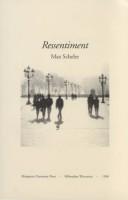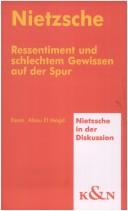| Listing 1 - 10 of 59 | << page >> |
Sort by
|

ISBN: 2020329646 9782020329644 Year: 1999 Publisher: Paris: Seuil,
Abstract | Keywords | Export | Availability | Bookmark
 Loading...
Loading...Choose an application
- Reference Manager
- EndNote
- RefWorks (Direct export to RefWorks)
Quel rapport y a-t-il entre la jouissance et la joie ? Accéder à la joie, c'est "se réjouir intérieurement". La joie témoigne d'un bonheur partagé ; la manière dont elle se communique dans le don dit la vérité d'une présence intime, irréductible à un objet de jouissance au sens juridique (avoir l'usufruit d'un bien) ou sexuel (profiter de la possession par les sens). Elle atteste la présence de l'Autre à l'intime de soi. Il y a une jouissance manifeste et répétitive que tout psychanalyste rencontre : celle qui consiste à épuiser, en le niant, le désir - dans la recherche d'un rassasiement qui ne dure jamais. Avec elle, l'homme ne se sent vivre qu'en vivant contre la vie, dans une rivalité jalouse et exclusive. Dans une certaine manière de vouloir jouir jusqu'au bout, de s'éclater ou d'aimer à mort, la fine pointe de la jouissance se répercute en écho de dérision. Au coeur de la folie ou de la perversion, c'est l'intensité de la sensation qui se donne pour la Vérité ; celle-ci n'est plus ce qui parle, mais ce qui se sent. Cette modalité jouissive du sensationnel exclut la parole et/ou le sens. Elle clôt la libido sur le même. Elle interdit au plaisir d'être la nécessaire médiation qui noue l'esprit et la chair dans une rencontre de sujets incarnés. Fermée à la parole, elle alimente la jouissance exclusive des sens. Elle enferme l'homme en lui-même, dans l'intensité d'un fantasme pris pour le réel et dont la répétition l'aliène. Faute de vivre de l'altérité au coeur du même, le désir tourne en déris, et la parole en dérision.
Resentment --- Joy

ISBN: 0874626021 Year: 1994 Publisher: Milwaukee Marquette university press
Abstract | Keywords | Export | Availability | Bookmark
 Loading...
Loading...Choose an application
- Reference Manager
- EndNote
- RefWorks (Direct export to RefWorks)
Ethics --- Resentment
Book
ISBN: 9781032470214 Year: 2024 Publisher: Abingdon Routledge
Abstract | Keywords | Export | Availability | Bookmark
 Loading...
Loading...Choose an application
- Reference Manager
- EndNote
- RefWorks (Direct export to RefWorks)
Dialectic. --- Resentment --- Philosophy.
Book
Abstract | Keywords | Export | Availability | Bookmark
 Loading...
Loading...Choose an application
- Reference Manager
- EndNote
- RefWorks (Direct export to RefWorks)
Contient : Schmidt, Thomas E. : Dialektik der Aufklärung. Zu einer Grundschrift des kulturkritischen Ressentiments. - Bolz, Norbert : Lust der Negation. Die Geburt der Kritischen Theorie aus dem Geist des Ressentiments.- Gebauer, Gunter : Das Ressentiment denkt: Rousseau - Nietzsche – Heidegger.- Seel, Martin : Zuneigung, Abneigung – Moral.- Vollhardt, Friedrich : Religion und Ressentiment- Seibt, Gustav : Das Paria-Volk. Nietzsche, Weber und die Juden.- Bubner, Rüdiger : Beobachtungen im Deutschland der allmählichen Globalisierung.- Bohrer, Karl Heinz : Die Kunst des Rühmens.- Schöttker, Detlev : Wir bleiben Helden. Die Renaissancen des Rühmens.- Rohde, Carsten : Text als Politik. Über Ressentiment im Poststrukturalismus.- Detering, Heinrich : Im Krieg der Gedanken. Von Thomas Manns »Gedanken im Kriege« zur Republikrede.- Fischer, Jens Malte : Der Haß ist fruchtbar noch. Karl Kraus - der Nörgler als Rechthaber.- Gumbrecht, Hans Ulrich : Die Entgrenzung des Ressentiments und die Geburt von Prosarhythmus. Eine Fallstudie zu Louis-Ferdinand Céline.- Demand, Christian : Kunst und Ressentiment.- Beaucamp, Eduard : Weltumarmung und Weltverneinung. Zur Dialektik moderner Kunst. -Müller, Hans-Peter : Soziale Ungleichheit und Ressentiment.- Hank, Rainer : Die ökonomische Kränkung.- Schlak, Stephan : Moral als Beute. Die Karriere der Ressentimentkritik.- Paris, Rainer : Ohnmacht als Pression. Über Opferrhetorik.- Körner, Jürgen : Ressentiments und Gegenressentiments. Psychoanalytische Betrachtungen.- Lau, Jörg : Männerhaß und Männerselbsthaß als kultureller Mainstream.- Lau, Mariam : Selbsthaß in der postnationalen Nation.- Herzinger, Richard : Das Ressentiment gegen den Westen.
Resentment --- Ethics --- Literature

ISBN: 3826011341 Year: 1996 Publisher: Würzburg : Königshausen & Neumann,
Abstract | Keywords | Export | Availability | Bookmark
 Loading...
Loading...Choose an application
- Reference Manager
- EndNote
- RefWorks (Direct export to RefWorks)
Book
ISBN: 9782072858550 2072858550 Year: 2020 Publisher: Paris: Gallimard,
Abstract | Keywords | Export | Availability | Bookmark
 Loading...
Loading...Choose an application
- Reference Manager
- EndNote
- RefWorks (Direct export to RefWorks)
Resentment --- Social sciences and psychoanalysis --- Social aspects --- Resentment - Social aspects
Book
ISBN: 9781609174712 1609174712 9781628962437 1628962437 1611861845 9781611861846 1628952431 9781628952438 Year: 2015 Publisher: East Lansing
Abstract | Keywords | Export | Availability | Bookmark
 Loading...
Loading...Choose an application
- Reference Manager
- EndNote
- RefWorks (Direct export to RefWorks)
This book is a response to Friedrich Nietzsche’s provocative question: How much and how does ressentiment condition our daily life? During the twentieth century we witnessed veritable eruptions of this insidious emotion, and we are still witnesses of its proliferation at various levels of society. This book aims to explore, according to Rene Girard’s mimetic theory, the anthropological and social assumptions that make up ressentiment and to investigate its genesis. The analysis of ressentiment shows that this emotion evolves from mimetic desire: it is an affective experience that people have when a rival denies them opportunities or valuable resources (including status) that they consider to be socially accessible. It is a specific figure of mimetic desire that is typical of contemporary society, where the equality that is proclaimed at the level of values contrasts with striking inequalities of power and access to material resources. This dichotomy generates increasing tension between highly competitive and egalitarian mimetic desires and growing social inequalities. The ressentiment is ambiguous, and its ambiguity is that of mimetic desire itself, which we cannot dismiss from our lives. In that it provides occasions of conflict and baseness, ressentiment can fuel violence, discord, and injustice, but it also can open opportunities for growth and justice, and for inventing institutions that are better adapted to the transformations of our contemporary society.
Desire (Philosophy) --- Resentment. --- Emotions --- Philosophy
Book
ISBN: 1509555366 Year: 2022 Publisher: Cambridge: Polity Press,
Abstract | Keywords | Export | Availability | Bookmark
 Loading...
Loading...Choose an application
- Reference Manager
- EndNote
- RefWorks (Direct export to RefWorks)
Capitalism --- Capital --- Resentment. --- Psychological aspects.
Book
ISBN: 9781805112907 9781805112914 1805112902 1805112910 1805112929 Year: 2024 Publisher: Cambridge, UK Open Book Publishers
Abstract | Keywords | Export | Availability | Bookmark
 Loading...
Loading...Choose an application
- Reference Manager
- EndNote
- RefWorks (Direct export to RefWorks)
Discussions about the ‘crisis of representative democracy’ have dominated scholarly and public discourse for some time now. But what does this phrase actually entail, and what is its relevance today? How do citizens themselves experience, feel and respond to this ‘crisis’? Bitter-Sweet Democracy grapples with the complexities of these questions in the context of citizens’ relations to politics in Belgium — a nation that has experienced political instability and protests as well as social mobilization and democratic vitality in recent years. This timely and compelling volume offers new, empirical evidence on the state of trust, democracy and representation in Belgium; it further introduces an innovative methodological and conceptual framework to study this ‘crisis’, specifically by developing the concept of political resentment. The essays in this collection span diverse topics, from citizens’ conceptions of democracy itself and the expression of political resentment among socioeconomically disadvantaged groups, to the influence of different emotional dimensions of resentment on protest behaviours. By adopting a distinctive affective lens and by building upon the specific case of Belgium, this volume contributes to the broader conversation on political resentment and the critical role of emotions in contemporary politics. [text taken from publisher's website]
Democracy --- Public opinion --- Resentment --- Belgium
Book
ISBN: 1003384250 1000953262 1032470216 1000953327 Year: 2023 Publisher: Milton : Taylor & Francis Group,
Abstract | Keywords | Export | Availability | Bookmark
 Loading...
Loading...Choose an application
- Reference Manager
- EndNote
- RefWorks (Direct export to RefWorks)
"Drawing upon a wide variety of authors, approaches, and ideological contexts, this book offers a comprehensive and detailed critique of the distinct and polemical senses in which the concept of ressentiment (and its cognate 'resentment') is used today. It also proposes a new mode of addressing ressentiment in which critique and polemics no longer set the tone. Contemporary tendencies in political culture such as neoliberalism, nationalism, populism,identity politics, and large-scale conspiracy theories have led to the return of the concept of ressentiment in armchair political analysis. This book argues that, due to the tension between its enormous descriptive power and its mutually contradicting ideological performances, it is necessary to 'redramatize' the concept of ressentiment. Inspired by Marxist political epistemology, affect theory, postcolonialism, and feminism, the book maps, delimits, and assesses four irreducible ways in which ressentiment can be articulated: the ways of the priest, the philosopher, the witness, and the diplomat. The first perspective is typically embodied by conservative (Scheler, Girard) and liberal (Smith, Rawls) political theory, the second by Nietzsche, Deleuze and Foucault, whereas the third is found in the writings of Améry, Fanon and Adorno, and the fourth is the author's own, albeit inspired by philosophers such as Ahmed, Stiegler, Stengers and Sloterdijk. In producing a dialectical sequence between all four typical modes of enunciation, the book seeks to answer the question by what right do we possess and use the concept of ressentiment, and what makes the phenomenon worth knowing? The Dialectic of Ressentiment will be of interest to scholars and advanced students working in critical theory, social and political philosophy, cultural studies, sociology, history, literature, and anthropology. It will also appeal to anyone interested in (public debates on) the politics of anger, discourse ethics, trauma studies, and memory politics"--
Resentment --- Dialectic. --- Philosophy. --- Polarity --- Polarity (Philosophy) --- Emotions
| Listing 1 - 10 of 59 | << page >> |
Sort by
|

 Search
Search Feedback
Feedback About UniCat
About UniCat  Help
Help News
News